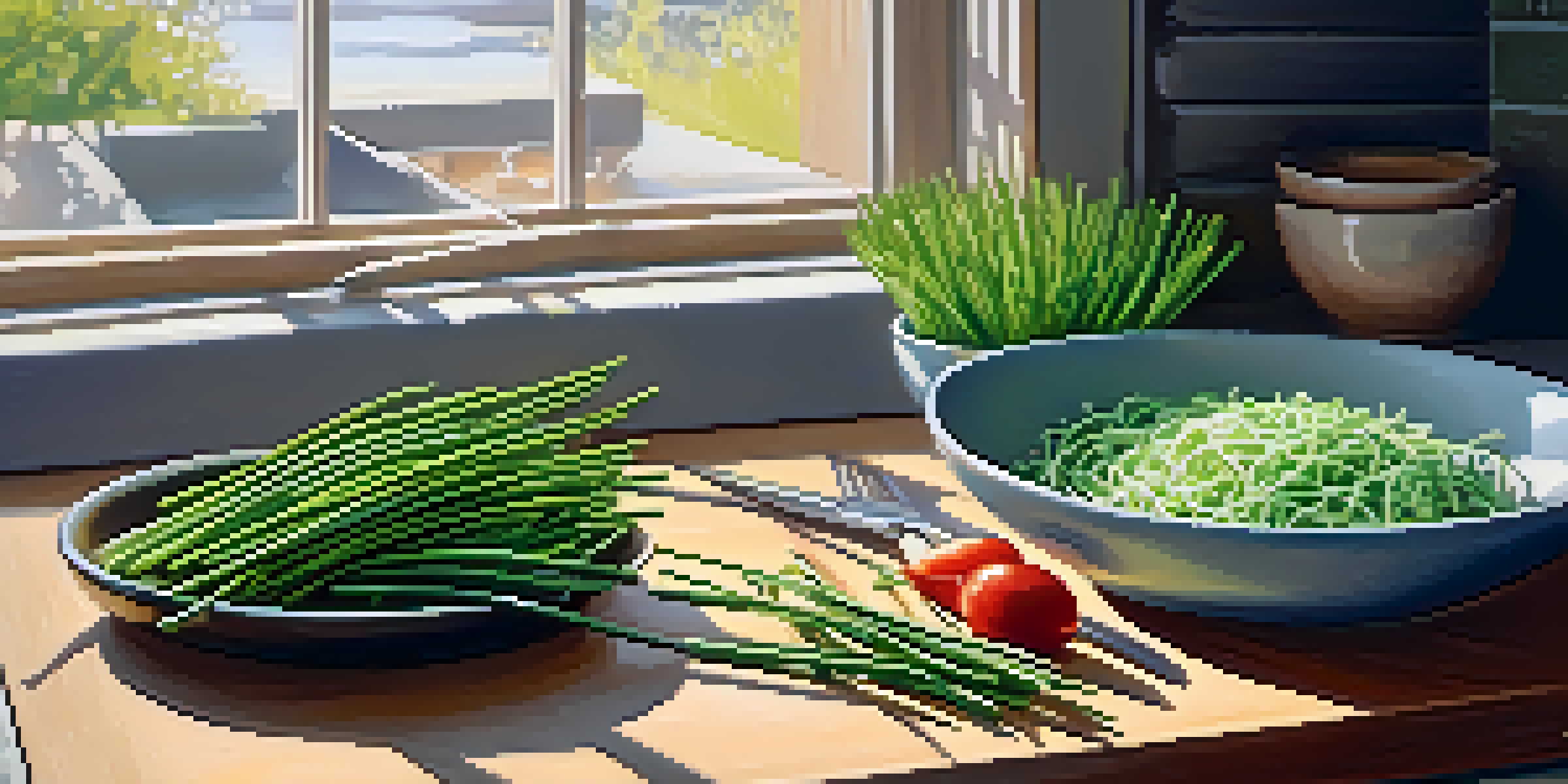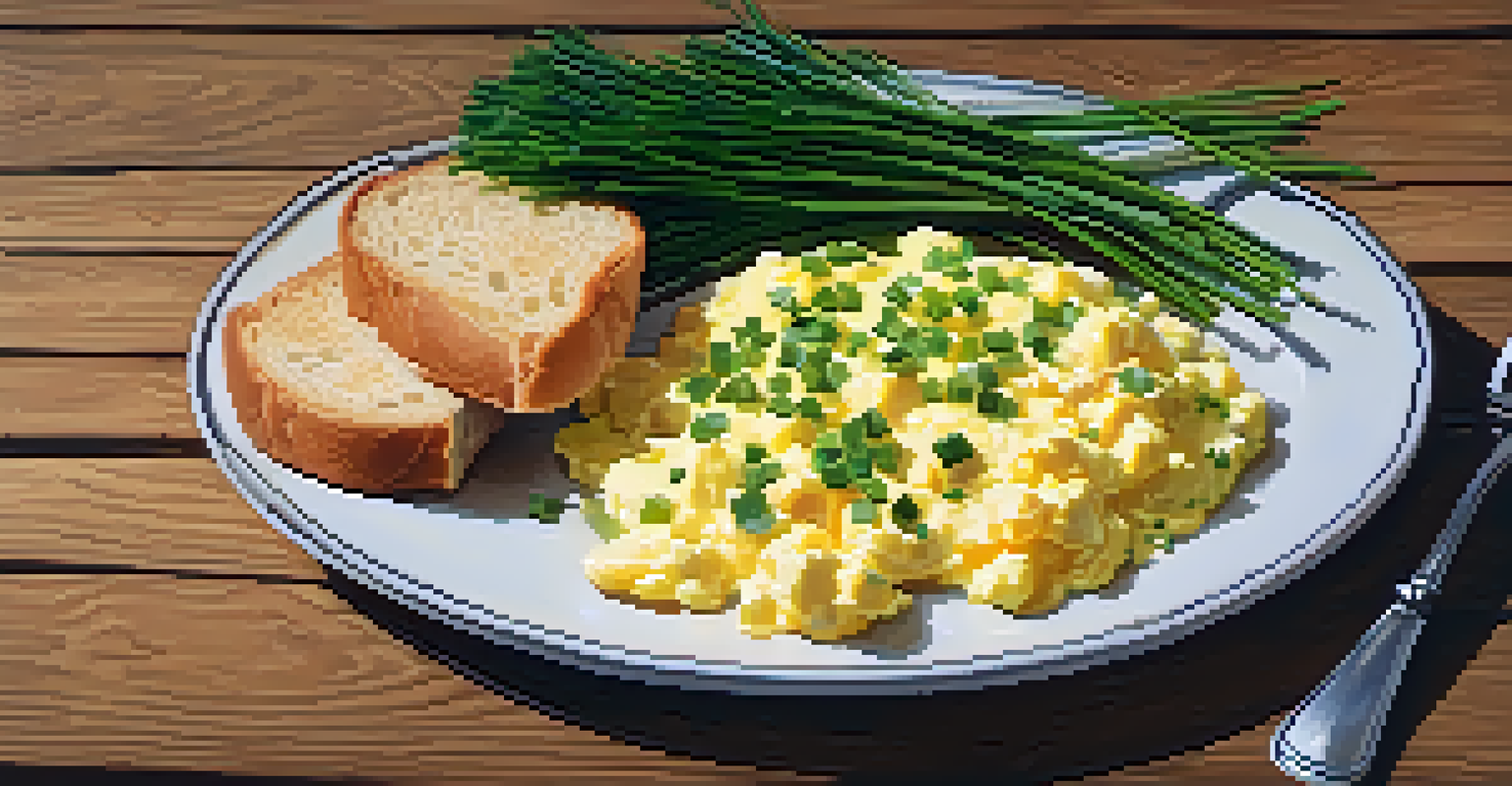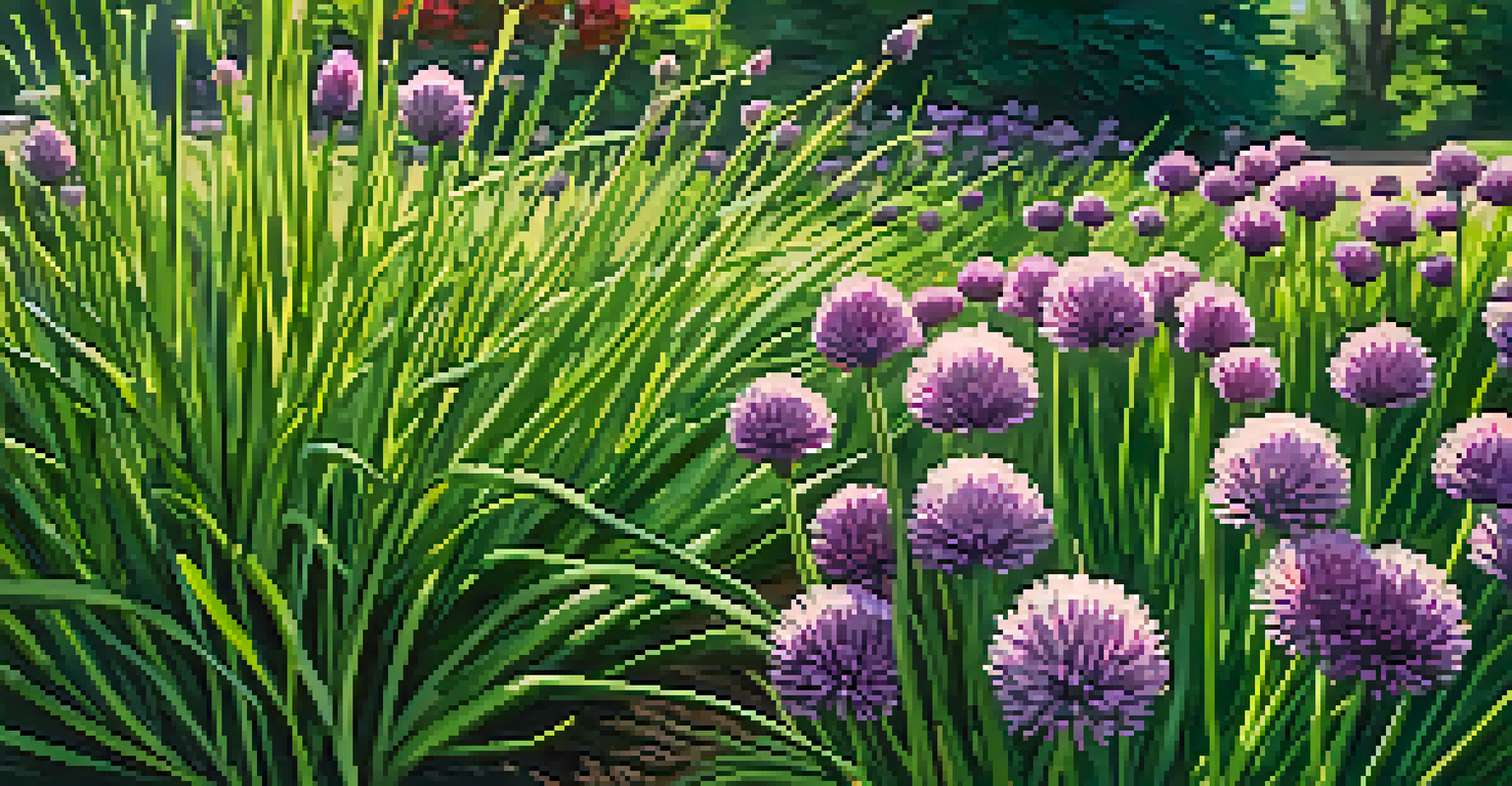Chives: A Small Herb with Big Flavor and Nutritional Value

What Are Chives and Their Culinary Uses?
Chives are a versatile herb belonging to the onion family, known for their long, slender green stalks. These tiny green wonders add a mild onion flavor to various dishes, making them a favorite among chefs and home cooks alike. You can find chives sprinkled on salads, mixed into dips, or as a garnish on soups, enhancing both taste and presentation.
Herbs are the friend of the cook and the delight of the eater.
Their subtle flavor allows them to complement a wide range of ingredients without overpowering them. Unlike more pungent onions or garlic, chives provide a gentle kick that brightens your meals. You might even enjoy them in scrambled eggs or atop baked potatoes for that extra zing and color.
Incorporating chives into your cooking is simple; just snip them fresh from the garden or purchase them at the store. They are best used fresh since cooking can diminish their delightful taste. So, next time you’re preparing a dish, consider reaching for some chives to elevate your culinary experience!
The Nutritional Benefits of Chives
Chives are not just about flavor; they pack a nutritional punch too! They are low in calories but high in essential vitamins such as Vitamin K, which plays a vital role in bone health. A sprinkle of chives can give you a boost of nutrients without adding unwanted calories to your meal.

In addition to Vitamin K, chives are rich in antioxidants, which help combat free radicals in the body. These compounds can aid in reducing inflammation and lowering the risk of chronic diseases. Moreover, chives contain dietary fiber, which is beneficial for digestive health and can help keep you feeling full.
Chives Enhance Culinary Flavor
Chives add a mild onion flavor to dishes, making them a versatile ingredient in various cuisines.
Including chives in your diet is a simple yet effective way to enhance your overall nutrition. Whether you’re looking to improve your health or add a touch of color to your plate, chives can play a significant role in your culinary and wellness journey.
Growing Chives at Home: A Beginner's Guide
Growing chives at home is an easy and rewarding endeavor, even for beginners! They thrive in well-drained soil and require plenty of sunlight, making them perfect for windowsills or garden beds. With minimal care, you can enjoy a fresh supply of chives right at your fingertips.
Cooking is like love. It should be entered into with abandon or not at all.
To start, plant chive seeds or seedlings in spring after the last frost. Water them regularly, but be careful not to overwater, as chives prefer slightly dry conditions. As they grow, you can trim the leaves to encourage more robust growth, ensuring a continuous harvest throughout the season.
One of the best parts about growing chives is their resilience; they can even survive in colder climates. Once established, they will come back year after year, providing you with a constant source of fresh herbs. Imagine stepping outside to snip some fresh chives for your dinner—what a delightful way to enhance your meals!
How to Store Chives for Maximum Freshness
To make the most of your chives, proper storage is essential. If you've bought them fresh or harvested them from your garden, keep them in the fridge to maintain their vibrant color and flavor. You can place them in a damp paper towel and seal them in a plastic bag or container for optimal freshness.
If you find yourself with an abundance of chives, consider freezing them. Chop the chives and place them in an ice cube tray filled with water or olive oil. Once frozen, transfer the cubes to a freezer bag for easy access whenever you need a flavor boost in your cooking.
Nutritional Benefits of Chives
Chives are low in calories and high in essential vitamins and antioxidants, promoting overall health.
Proper storage can extend the life of your chives and reduce waste, allowing you to enjoy their culinary benefits for longer. By taking a few simple steps, you can ensure that your chives remain fresh and ready to elevate your dishes.
Chives in Different Cuisines Around the World
Chives are celebrated in various cuisines around the globe, each adding their unique twist to this humble herb. In French cuisine, for instance, chives are a vital ingredient in classic sauces like crème fraîche, providing a delicate onion flavor that enhances the dish. They are also a key component in the famous French herb blend, fines herbes.
In Asian cooking, chives are often used in dumplings and stir-fries, showcasing their versatility across flavor profiles. The mild taste of chives complements stronger ingredients like ginger and garlic, creating a harmonious balance in dishes. You might find chives in Korean pancakes, adding a pop of color and flavor.
Wherever you go, chives make their mark, proving that this small herb has a big impact. Exploring how different cultures incorporate chives into their meals can inspire you to experiment with this delightful herb in your own cooking adventures.
Creative Ways to Use Chives in Your Cooking
While chives are often used as a garnish, there are countless creative ways to incorporate them into your meals. For example, you can blend chives into creamy dips or spreads for a flavorful twist. Imagine a chive-infused cream cheese spread on a bagel—delicious!
Another fun idea is to make chive oil by blending fresh chives with olive oil. This vibrant green oil can be drizzled over salads, grilled vegetables, or used as a finishing touch on your favorite dishes. It’s not just tasty; it’s also visually stunning!
Easy to Grow at Home
Chives are simple to grow in gardens or pots, providing a fresh supply of herbs for culinary use.
You can also experiment by adding chives to baked goods like savory scones or muffins. Their mild flavor can enhance your favorite recipes, giving them a fresh, herbal note. With a little creativity, chives can take center stage in your culinary creations!
Potential Health Considerations When Using Chives
While chives are generally safe for most people, it's essential to be aware of potential allergies or sensitivities. Some individuals may experience mild digestive issues after consuming chives, especially if they have a sensitivity to other members of the onion family. Always listen to your body and consult a healthcare professional if you have concerns.
Chives are also relatively high in oxalates, which can be an issue for individuals prone to kidney stones. If you have a history of kidney stones, it might be wise to consume chives in moderation. This doesn’t mean you have to avoid them altogether; just be mindful of how much you're incorporating into your diet.

As with any herb or food, moderation is key. Enjoying chives as part of a balanced diet can provide numerous health benefits while adding delightful flavor to your meals. Always prioritize your health and well-being when experimenting with new ingredients.